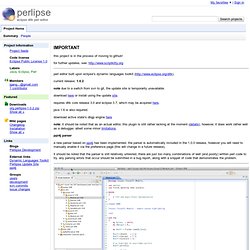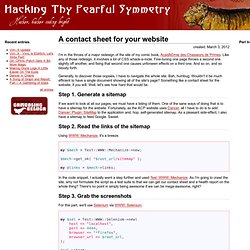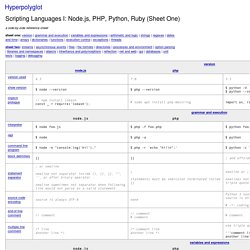

Farabi – a web based Perl editor » » PAL-Blog. Passwords. Charting. CPAN modules for making HTTP requests. This article is a review of 20 CPAN modules that can be used to make HTTP requests. Many of the modules can handle FTP and other types of requests, but here I'm just focussing on HTTP, and in particular GET and POST requests. If you're thinking "Sheesh, just tell me what module to use! ", here's a concise summary of the recommendations: A sensible default choice would be HTTP::Tiny: it handles all requests types, supports SSL, transparently handles redirects, and has a relatively small number of dependencies. If you're working with cookies or need full access to the request and/or response, and top performance and minimal dependencies aren't requirements, then use LWP (or Mojo::UserAgent if you're already using Mojolicious). The following table lists the modules reviewed, along with basic information.
I intentionally excluded modules like WWW::Mechanize, which provide higher-level functions. In comparing the modules, I'm looking at the following: Does it provide a clean simple interface? Perlipse - eclipse dltk perl editor. This project is in the process of moving to github!

For further updates, see: perl editor built upon eclipse's dynamic languages toolkit ( current release: 1.0.2 note due to a switch from svn to git, the update site is temporarily unavailable. download here or install using the update site. requires dltk core release 3.0 and eclipse 3.7, which may be acquired here. java 1.6 is also required. download active state's dbgp engine here note: it should be noted that as an actual editor, this plugin is still rather lacking at the moment (details), however, it does work rather well as a debugger, albeit some minor limitations. ppi4j parser a new parser based on ppi4j has been implemented. the parser is automatically included in the 1.0.0 release, however you will need to manually enable it via the preference page (this will change in a future release).
Map of CPAN. Hacking Thy Fearful Symmetry - A contact sheet for your website. Created: March 3, 2012 I'm in the throes of a major redesign of the site of my comic book, Académie des Chasseurs de Primes.

Like any of those redesign, it involves a lot of CSS whack-a-mole. Fine-tuning one page throws a second one slightly off another, and fixing that second one causes unforseen effects on a third one. And so on, and so bloody forth. Generally, to discover those oopsies, I have to navigate the whole site. Step 1. If we want to look at all our pages, we must have a listing of them. Using WWW::Mechanize, it's a breeze. my $mech = Test::WWW::Mechanize->new; $mech->get_ok( "$root_url/sitemap" ); my @links = $mech->links; In the code snippet, I actually went a step further and used Test::WWW::Mechanize. Step 3. For this part, we'll use Selenium via WWW::Selenium. Yes, in those few lines, we visited all of our website's pages and generated a screenshot of every single one of them.
Step 4. For this I went with the good old GD module. Step 6. Perl - Storing object on the DB and retrieving it. Interpreted Languages: PHP, Perl, Python, Ruby (Sheet One) - Hyperpolyglot. A side-by-side reference sheet sheet one: version | grammar and execution | variables and expressions | arithmetic and logic | strings | regexes | dates and time | arrays | dictionaries | functions | execution control | exceptions | threads sheet two: streams | asynchronous events | files | file formats | directories | processes and environment | option parsing | libraries and namespaces | objects | inheritance and polymorphism | reflection | net and web | gui | databases | unit tests | logging | debugging sheet two: streams | asynchronous events | files | directories | processes and environment | option parsing | libraries and namespaces | objects | inheritance and polymorphism | reflection | net and web | gui | databases | unit tests | logging | debugging version used The versions used for testing code in the reference sheet. show version How to get the version. php: The function phpversion() will return the version number as a string. python: import platform platform.python_version() ruby: <?

Change Log LWP - libwww-perl-6. Strawberry Perl for Windows - Releases.